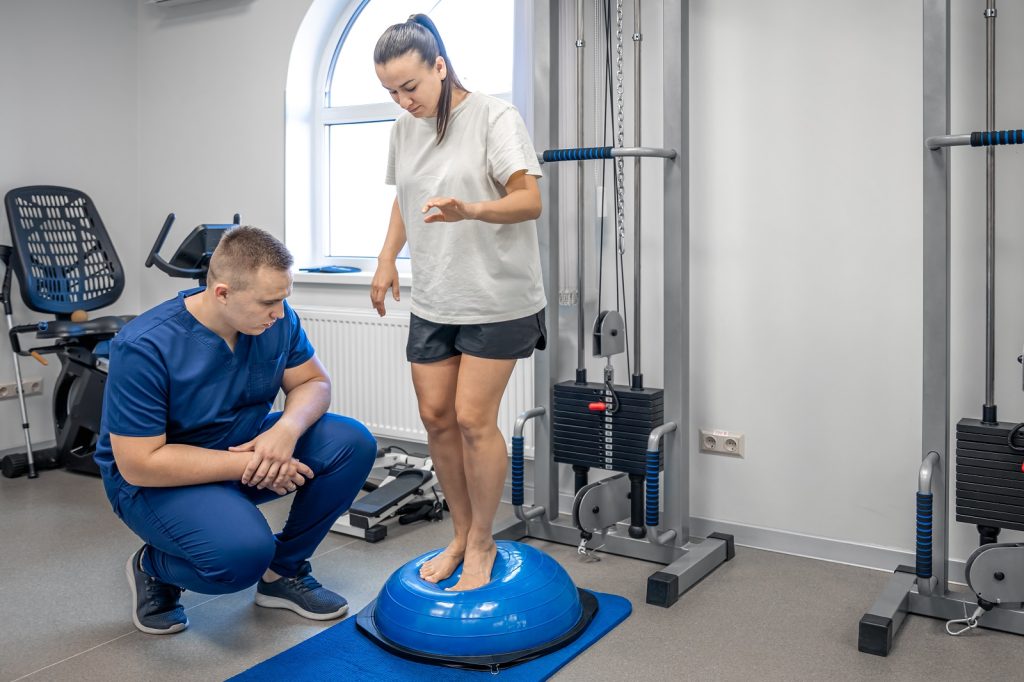Exercise Therapy
Exercise therapy, also known as therapeutic exercise or physiotherapy, is a cornerstone of rehabilitation and preventive healthcare. It utilizes targeted physical activities and movements to improve mobility, function, and overall well-being. Whether recovering from an injury, managing a chronic condition, or striving for peak physical performance, exercise therapy offers a holistic approach to health that addresses both the body and mind.
Examples of Exercise Therapy Modalities:
- Strength Training: Using resistance bands, free weights, or bodyweight exercises to build muscle strength and endurance.
- Cardiovascular Exercise: Activities such as walking, cycling, swimming, or aerobic classes to improve heart and lung function.
- Flexibility and Stretching: Stretching routines to improve joint mobility, reduce stiffness, and prevent injuries.
- Balance and Coordination Exercises: Exercises to enhance stability, proprioception, and coordination, reducing the risk of falls and injury.
5. Functional Movement Training: Integrating exercises that mimic everyday movements to improve overall function and quality of life.

Key Principles of Exercise Therapy:
- Individualized Approach: Exercise therapy recognizes that each person has unique needs and goals. Therefore, therapy programs are tailored to the individual. Therapists conduct thorough assessments, considering factors such as medical history, current fitness level, and specific challenges. By understanding the individual’s circumstances, therapists can create personalized plans that address their unique requirements, maximizing effectiveness and ensuring safety.
- Progressive Loading: Exercise programs in therapy are designed with a principle of progressive loading. This means that over time, the intensity, duration, or complexity of exercises gradually increases. By systematically challenging the body’s capabilities in a controlled manner, progressive loading helps to stimulate adaptations such as increased strength, endurance, and flexibility. Importantly, this gradual progression minimizes the risk of injury by allowing the body to adapt and recover adequately between sessions.
- Functional Training: Exercise therapy emphasizes functional training, which involves exercises that mimic real-life movements. By focusing on activities that are relevant to daily life or specific sports, therapy aims to improve functional capacity. These exercises not only enhance strength, flexibility, and coordination but also help individuals regain independence and optimize performance in their chosen activities. Functional training promotes the transfer of improvements gained in therapy to real-world scenarios, improving overall quality of life.
- Education and Empowerment: Exercise therapy encompasses education and empowerment as essential components of the process. Therapists don’t just prescribe exercises; they empower individuals with knowledge about their condition and the role of physical activity in improving health. Through education on proper technique, posture, and self-management strategies, individuals learn how to effectively manage their condition and prevent future issues. This knowledge empowers individuals to take an active role in their rehabilitation or performance enhancement journey, fostering long-term success and well-being.
Benefits of Exercise Therapy:
- Improved Physical Function: Regular participation in exercise therapy leads to enhanced physical function. Through targeted exercises, individuals improve strength, flexibility, and cardiovascular fitness. This improvement enables them to perform daily tasks with greater ease and efficiency, ultimately enhancing their overall quality of life and independence.
- Pain Management: Exercise therapy serves as a powerful tool for managing pain. By strengthening muscles, improving joint mobility, and releasing endorphins (the body’s natural painkillers), exercise helps alleviate pain associated with various conditions such as arthritis, musculoskeletal injuries, and chronic pain syndromes. Additionally, exercise can improve posture and body mechanics, reducing strain on painful areas and promoting long-term pain relief.
- Disease Prevention and Management: Exercise therapy plays a crucial role in preventing and managing chronic diseases such as cardiovascular disease, diabetes, osteoarthritis, and osteoporosis. By engaging in regular physical activity, individuals can control risk factors such as high blood pressure, high blood sugar levels, and excess weight. Exercise also improves circulation, strengthens the heart, and promotes bone density, reducing the risk of complications and improving overall health outcomes.
- Enhanced Mental Well-being: Physical activity has profound effects on mental health, and exercise therapy is no exception. By engaging in regular exercise, individuals experience reductions in stress, anxiety, and depression levels. Exercise promotes the release of endorphins and other neurotransmitters that elevate mood and promote relaxation. Additionally, exercise therapy provides a sense of accomplishment and mastery, boosting self-esteem and confidence. Improved cognitive function and better sleep quality are additional benefits that contribute to overall psychological well-being.
- Optimized Sports Performance: Athletes utilize exercise therapy to enhance performance, recover from injuries, and prevent future injuries. By addressing muscle imbalances, improving biomechanics, and optimizing conditioning, athletes can reach their full potential on the field or court. Exercise therapy focuses on sport-specific movements and functional training, improving agility, speed, strength, and endurance. Additionally, targeted rehabilitation exercises help athletes recover from injuries more efficiently, reducing downtime and promoting a safe return to sport.

Conclusion:
Exercise therapy is a powerful tool for promoting health, rehabilitation, and performance optimization across the lifespan. By incorporating evidence-based exercise prescriptions and personalized care, therapists empower individuals to take control of their health and live life to the fullest.
Whether recovering from injury, managing a chronic condition, or pursuing peak athletic performance, exercise therapy offers a pathway to a healthier, more active lifestyle.
Contact Us:
Feel free to contact Dr. Burhan to book a consultation and discover how exercise therapy can benefit your health. Dr. Burhan and his experienced team provide personalized care and advanced exercise therapy techniques to help you achieve optimal health and well-being. Reach out today to take the first step towards a more active and healthier life.


